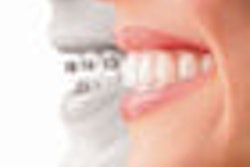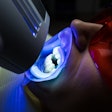
Reversing a controversial policy put into effect last year, Align Technology announced April 22 that, effective immediately, it will no longer require all dentists who want to be active Invisalign providers to start at least 10 Invisalign cases annually.
The concurrent policy of completing at least 10 Invisalign continuing education (CE) hours annually is still in place, however.
According to Align, the intent behind the 10-case policy was to help ensure that Invisalign providers build a baseline of Invisalign product experience and knowledge through minimum annual case and CE goals.
“The complaint was that the patient doctor relationship was being compromised by what they considered to be a sales quota.”
— Dan Ellis, vice president of North
American sales, Invisalign
However, the company came under fire last year after announcing the policy on June 1, with some dental practitioners arguing that the company's new policy was more about a desire to increase sales and revenues than to protect consumers.
In addition, both the ADA and the Academy of General Dentistry (AGD) began negotiating with Align to reverse the proficiency requirement after receiving numerous complaints from members. In fact, more than 1,500 AGD members voiced their concerns directly to the president of Align, according to the AGD.
At the time, Align defended the program, saying the change was necessary to maintain the integrity of the Invisalign brand and ensure that patients receive the best treatment possible.
"The goal was that we should have the confidence to direct any patient to a provider at anytime and know that they would deliver the best possible service," Dan Ellis, vice president of North American sales, told DrBicuspid.com. "Over time, many doctors had become providers but had not kept up with the product usage or the CE, which was disrespectful to the doctors who had."
'Right thing to do'
So why reverse the policy?
The move was prompted by customer demand expressed through thousands of e-mails and phone calls, said Ellis, noting that "the company should not be at odds with its customers or the marketplace." Even customers who were meeting the requirements were frustrated with the policy, he added.
"We fundamentally listened to our customers," Ellis said. "They understand that the intent was pure, but the complaint was that the patient-doctor relationship was being compromised by what they considered to be a sales quota."
The move was not prompted by the current economy or a drop in sales, he emphasized, noting the company's recently announced robust financial results.
"Business is financially very healthy and sales are robust, but it was the right thing to do by the marketplace," Ellis said.
Align will now focus on customer loyalty and rewards programs to help drive treatment experiences and results. As part of this focus, the company will continue to promote the benefits of Invisalign Preferred Provider status for doctors who start 10 or more cases each year and will give preferential treatment and direct marketing resources to doctors who are dealing with a high volume of Invisalign cases, a company spokesperson explained.
Doctors who do not complete a minimum of 10 Invisalign CE hours in a calendar year will have their Invisalign accounts temporarily suspended until they complete the minimum CE hours. Doctors whose customer accounts were deactivated or changed to limited status for failing to meet the 2009 proficiency requirements can reactivate their account and start using Invisalign again at any time by completing a Clear Essentials I or Clear Principles training course and thereafter meeting the annual 10 CE hour requirement.
More information on the proficiency program and related changes are available on the Invisalign Web site.
Copyright © 2010 DrBicuspid.com



















